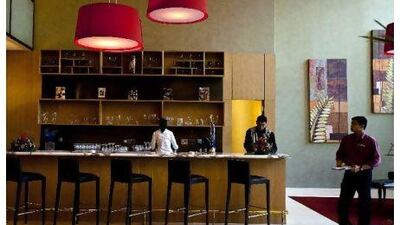Restaurants in the five-star Grand Millennium Al Wahda hotel, which opened two months ago in Abu Dhabi, should by now be bustling with customers at lunchtime.
But the large Italian restaurant, Portobello Trattoria, is empty, although attentive staff are poised to serve guests. And the Asian restaurant, Toshi, which should be a popular afternoon venue, does not open until the evening.
Meanwhile, the doors to the hotel's Porterhouse Bar and Grill are firmly locked. All this is because the hotel is unable to serve alcohol.
The property, managed by the global hospitality company Millennium and Copthorne Hotels, has been beset with problems in securing an alcohol licence because of bureaucratic procedures, it says.
The delay is having a major impact on profits because the hotel had anticipated that food and beverage would make up 40 per cent of its revenue.
"This is obviously a challenge to have no liquor licence," said Michael Sorgenfrey, the hotel's general manager. "It's a loss. We are not the first one. I have to live with this because I cannot close the doors.
"We have done everything from the hotel's point of view, but everything else is the authorities'. From our side we can't do any more."
Food and beverage revenue across Abu Dhabi's hotels reached Dh1.1 billion (US$299 million) for the first 10 months of this year, a 13 per cent increase on the same period last year, according to the Abu Dhabi Tourism Authority.
That accounts for 36 per cent of total hotel revenue for the period this year compared with 30 per cent last year.
In particular, Mr Sorgenfrey said, the lack of a licence would hurt the Grand Millennium's Christmas and New Year revenue because the property could not promote festivities. The problem was also driving away some room bookings, he said.
About 700 of the hotel's 844 rooms have so far opened, Abu Dhabi's largest by room count.
"From our research, the sale of alcohol impacts not only on the revenue levels and profitability generated from hotel food and beverage operations, but it also affects the appeal of the hotel to particularly non-GCC clientele," said an analyst at Jones Lang LaSalle Hotels.
"The sale of alcohol is usual in most business and leisure destinations and is often required as part of the brand standards for four and five-star quality properties."
That the hotel is unable to open its Porterhouse grill, a two-level bar and restaurant, translates into a major revenue loss.
Another lounge bar in the hotel is also closed. Hoteliers in Abu Dhabi confirmed that some new hotels had also encountered problems in obtaining liquor licences, which are issued by the Abu Dhabi Police.
Mr Sorgenfrey said the hotel was focusing on the conference business, a market segment for which it was competitively placed because of its ability to accommodate large groups.
A number of other highly anticipated hotels are to open in Abu Dhabi next year, including the Park Hyatton Saadiyat Island, and the Rocco Forte and the Jumeirah in the city.
"There are so many hotels coming up [next year]," Mr Sorgenfrey said. The other hotels "are concerned because we are a giant. They should be scared of us. They are the piranhas around the shark."

